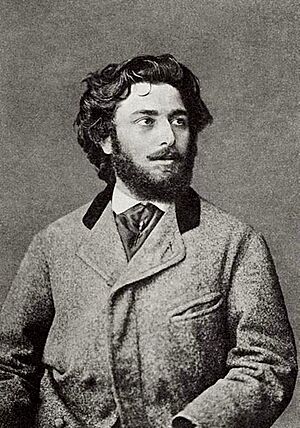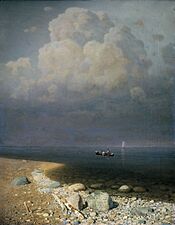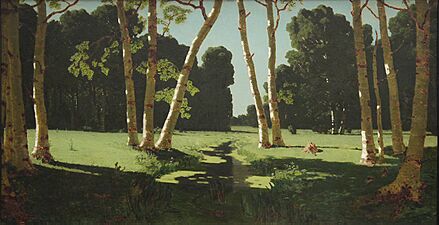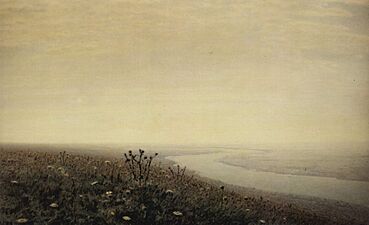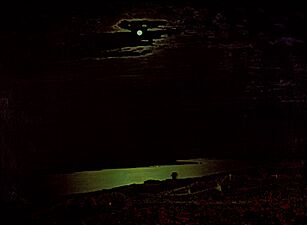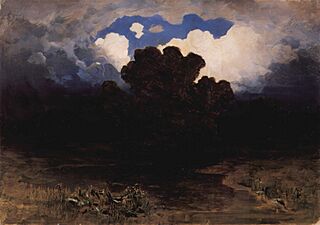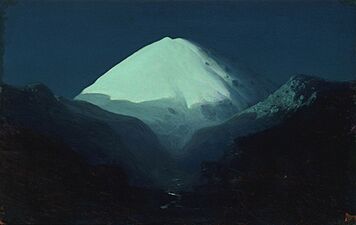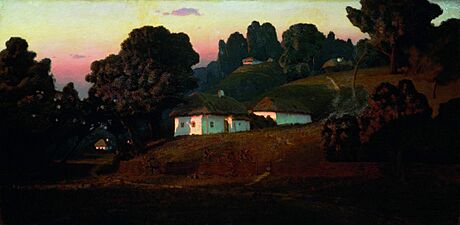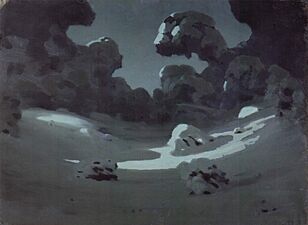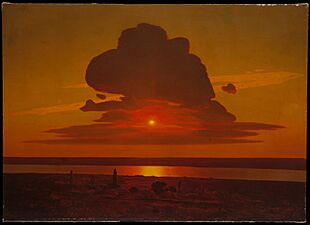Arkhip Kuindzhi facts for kids
Quick facts for kids
Arkhip Kuindzhi
|
|
|---|---|
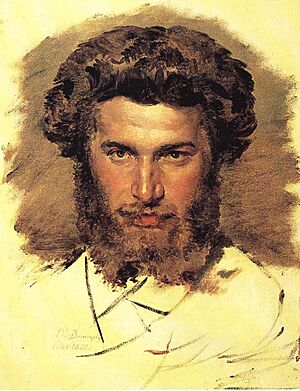
Portrait of Kuindzhi by Viktor Vasnetsov, 1869
|
|
| Born | 27 January 1841 Mariupol uezd, Russian Empire (present-day Mariupol, Ukraine)
|
| Died | 24 July 1910 (aged 69) St. Petersburg, Russian Empire
|
| Education | Full Member Academy of Arts (1893) |
| Alma mater | Imperial Academy of Arts (1868) |
| Known for | Painting |
|
Notable work
|
|
| Movement | Luminism |
| Awards | Bronze Medal (London, 1874) |
| Patron(s) | Pavel Tretyakov |
Arkhip Ivanovich Kuindzhi (Russian: Архип Иванович Куинджи; Greek: Αρχίπ Ιβάνοβιτς Κουίντζι; January 27, 1841 – July 24, 1910) was a famous landscape painter. He was from a Greek family in the Russian Empire.
Contents
Who was Arkhip Kuindzhi?
Arkhip Kuindzhi was born in a place called Mariupol uezd in what is now Ukraine. He grew up in the city of Taganrog. His first name, Arkhip, comes from a Greek word meaning "master of horses." His last name, Kuindzhi, means 'goldsmith' in the Crimean Tatar language.
Arkhip came from a poor family. His father was a shoemaker. When Arkhip was only six years old, both his parents passed away. This meant he had to start working early to support himself. He worked at a church, took care of animals, and helped at a corn shop. He learned to read and write from a family friend who was a teacher.
Learning to Paint
When Arkhip was about 13 or 14, he went to Feodosia to study art. He hoped to learn from the famous painter Ivan Aivazovsky. However, he mostly mixed paints for Aivazovsky's student, Adolf Fessler. Even so, Aivazovsky's style of painting light and powerful nature scenes influenced young Kuindzhi a lot.
For five years, from 1860 to 1865, Arkhip worked as a photo retoucher in Taganrog. He even tried to open his own photo studio, but it didn't work out. After that, he moved to Saint Petersburg to focus on painting.
He mostly taught himself how to paint. He also studied at the St. Petersburg Academy of Arts starting in 1868. He later became a full member of the Academy.
Joining the Peredvizhniki Artists
Kuindzhi joined a group of realist artists called the Peredvizhniki. This group, also known as the "Wanderers," was formed in 1870. They traveled around to show their art because they didn't like the strict rules of the art academies.
In 1872, Kuindzhi left the Academy to work on his own. His painting On the Valaam Island was bought by Pavel Tretyakov for his famous art gallery. In 1873, Kuindzhi's painting The Snow won a bronze medal at an art show in London.
In the mid-1870s, he painted many landscapes that showed real-life scenes, like Forgotten Village (1874) and Chumatski Path (1875). Both of these are in the Tretyakov Gallery.
His Unique Style
As Kuindzhi grew as an artist, he wanted to capture the most amazing light in nature. He used special ways of composing his paintings, like high horizons, to create wide, panoramic views. He used strong light effects and bright colors to make it seem like the paintings were glowing.
Some of his most famous paintings from this time include:
- Evening in Ukraine (1876)
- A Birch Grove (1879)
- After a Thunderstorm (1879)
- Moonlit Night on the Dnieper (1880)
These paintings are known for their beautiful, glowing colors.
Kuindzhi was also good friends with the famous chemist Dmitri Mendeleev, who taught at Saint Petersburg State University. Kuindzhi even attended some of Mendeleev's classes. He often visited Mendeleev and became very interested in how light, color, and what we see work together.
Teaching and Legacy
Kuindzhi became a professor at the St. Petersburg Academy of Arts in 1892. He led the landscape painting workshop starting in 1894. However, he was later fired in 1897 because he supported students who were protesting.
Many famous artists were his students, including Arkady Rylov, Nicholas Roerich, and Konstantin Bogaevsky. In 1909, Kuindzhi helped start the Society of Artists, which was later named after him.
Artworks in the News
In January 2019, one of Kuindzhi's paintings, Ai-Petri. Crimea, was stolen from the Tretyakov Gallery in Moscow. Luckily, it was found and safely returned the very next day! The person who took it was sent to prison.
In March 2022, during a conflict, the Kuindzhi Art Museum in Mariupol was destroyed by an airstrike. None of Kuindzhi's original paintings were in the museum at the time. However, three of his original works—a sketch for Red Sunset, and two other paintings, Elbrus and Autumn—had been moved from the museum before the bombing. They were later taken by another country.
Tribute
On January 27, 2022, Google Doodle celebrated Arkhip Kuindzhi's 180th birthday, honoring his amazing contributions to art.
Gallery
-
Lake Ladoga (1873)
-
Dnieper in the Morning (1881)
-
Elbrus (1890–1895)
See also
- List of Russian artists
 | Jessica Watkins |
 | Robert Henry Lawrence Jr. |
 | Mae Jemison |
 | Sian Proctor |
 | Guion Bluford |


